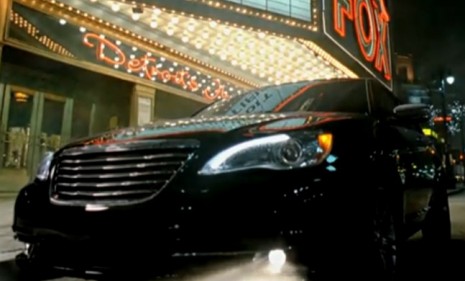Chrysler's 'embarrassing' decision to spend $9 million on a Super Bowl ad
Many critics were inspired by the car company's two-minute defense of Detroit. Others argue that the price is inappropriately high for a company in debt

A free daily email with the biggest news stories of the day – and the best features from TheWeek.com
You are now subscribed
Your newsletter sign-up was successful
Chrysler broadcast an epic two-minute commercial during the Super Bowl that was less a traditional car ad than a tribute to Detroit. (See video below.) The commercial — the longest in Super Bowl history — proved a big hit with audiences and critics, who connected with its stirring imagery and hopeful message about the struggling city's future. But not everyone was left inspired by Chrysler's paean to the Motor City. A Republican congressman and other conservatives were quick to point out that Chrysler still owes the government $5.8 billion in bailout money, and that spending millions on an ad is problematic for a beleaguered company in debt. (Chrysler's CEO says the ad cost less than $9 million.) Was the car maker right to splurge on its buzzworthy spot?
The ad was too expensive and misleading: "Chrysler took $15 billion from taxpayers, to which it wasn't entitled," says J.P. Freire at The Washington Examiner, and made a commercial full of falsehoods. For instance, Chrysler did not "go through the hottest fires," as the ad suggests — unless "hottest fires" means "skipping bankruptcy and asking for a handout to protect union pensions." This hypocritical ad just goes to show "how the federal government picks winners and losers. Guess which part the taxpayers play?"
"Chrysler reveals $9 million Super Bowl ad while requesting more taxpayer dollars
The Week
Escape your echo chamber. Get the facts behind the news, plus analysis from multiple perspectives.

Sign up for The Week's Free Newsletters
From our morning news briefing to a weekly Good News Newsletter, get the best of The Week delivered directly to your inbox.
From our morning news briefing to a weekly Good News Newsletter, get the best of The Week delivered directly to your inbox.
The commercial was insulting, too: It's bad enough that the U.S. spent billions to rescue Chrysler after decades of poor decisions, says Ed Morrissey at Hot Air. Now this ad, coupled with recent complaints from Chrysler's CEO that the government was charging his company outrageous interest rates, really puts things over the top. This commercial was truly "the most embarrassing gaffe" of the Super Bowl.
"The most embarrassing Super Bowl gaffe?"
The pay-off has been worth it: Despite "advance criticism of Chrysler for making a $9 million commitment," says Alissa Priddle in The Detroit News, this ad has made an almost unprecedented impact. It continues to "live large on the internet." More than 2,000 news organizations have mentioned it, generating more than 200 million web hits. On YouTube, "the video has been viewed more 1.2 million times in less than 24 hours." And the "ad is already proving its value." Web traffic to the Chrysler 200 site increased more than 1,600 percent in the hours after the ad aired.
"Chrysler scores hit with risky ad"
A free daily email with the biggest news stories of the day – and the best features from TheWeek.com
-
 Nuuk becomes ground zero for Greenland’s diplomatic straits
Nuuk becomes ground zero for Greenland’s diplomatic straitsIN THE SPOTLIGHT A flurry of new consular activity in the remote Danish protectorate shows how important Greenland has become to Europeans’ anxiety about American imperialism
-
 ‘This is something that happens all too often’
‘This is something that happens all too often’Instant Opinion Opinion, comment and editorials of the day
-
 House votes to end Trump’s Canada tariffs
House votes to end Trump’s Canada tariffsSpeed Read Six Republicans joined with Democrats to repeal the president’s tariffs